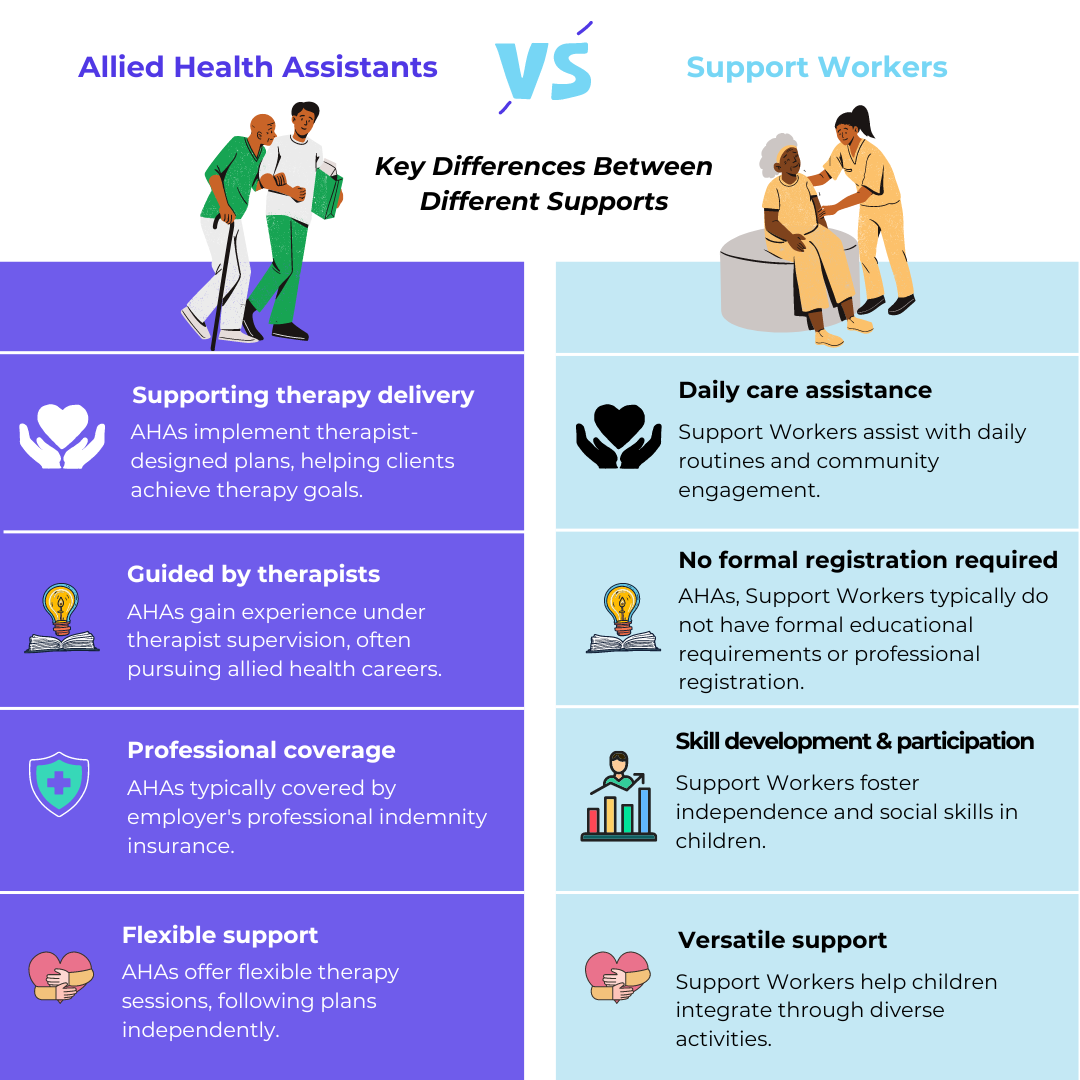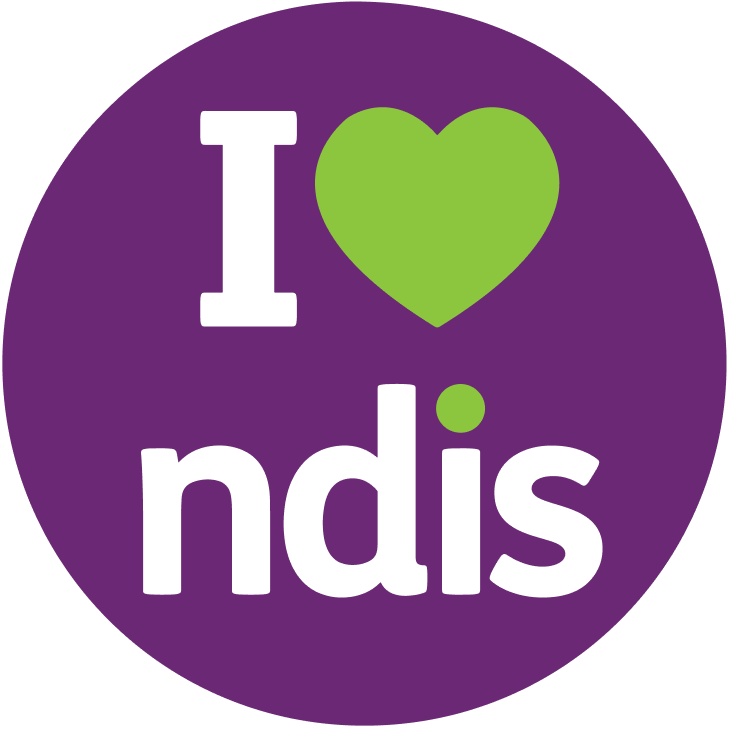What’s the difference between a Support Worker and Allied Health Assistant?
October 3, 2024 | By Fora
Buckle up folks!
We’re diving into the world of therapy support superheroes – Allied Health Assistants (AHAs) and Support Workers. These unsung champions are the secret sauce in helping therapy participants crush their goals.
But what’s the difference???
Let’s break it down, no snooze-fest government jargon here!

Allied Health Assistants (AHAs) Understanding AHAs and SWsUnderstanding AHAs and SWs
AHAs, also known as Therapy Assistants, are trained workers whose role is to help a client implement therapy under the direct or indirect supervision of qualified therapists, such as speech pathologists, occupational therapists or physiotherapists. Typically they are allied health university students or TAFE graduates with cert 3/4 in AHA
Key Responsibilities:
- Supporting Therapy Delivery: AHAs help participants implement therapy plans developed by the supervising therapist, focusing on specific goals and techniques, especially to help embed therapy into a person and families daily routine.
- Guided by Therapists: They work under the direct or indirect supervision of a therapist and are often studying to become fully qualified allied health professionals, gaining practical experience along the way.
- Professional Coverage: AHAs are generally covered by their employer’s or supervising therapist’s professional indemnity insurance, ensuring peace of mind for both families and therapists.
Benefits of AHAs:
- Progress Monitoring: They can track a person’s progress and provide valuable feedback to the therapist, ensuring therapy goals are met efficiently. Especially useful if the AHP is clinic based and the AHA sees the client in a home environment.
- Flexible Support: AHAs can work somewhat independently, offering flexibility to families (in relation to home environment, community, school sessions, timings, after hours, weekends, etc.) while still ensuring the therapy plan is followed.
Support Workers
(SWs)Understanding AHAs and SWs
Support Workers provide a broader range of assistance, helping participants with everyday activities and general care. Their focus is more on supporting life skills and day-to-day functioning.
Key Responsibilities:
- Daily Care Assistance: Support Workers assist with daily tasks, including helping with morning and evening routines, engaging in social activities, and supporting community participation.
- Skills Development & Participation: They support participants in developing independence, social skills, and participation in recreational or community-based activities.
- No Formal Registration Required: Unlike AHAs, Support Workers typically do not have formal educational requirements or professional registration. They may have diverse backgrounds and offer a wide range of support options depending on the family’s needs.
Benefits of Support Workers:
- Versatile Support: Support Workers assist with various tasks, from community outings to social activities, helping participants integrate into different environments.
- Accessible Help: With fewer formal requirements, it is easier to find a Support Worker who can assist in different situations, providing valuable day-to-day help for families.
- Cost-Effective: Support Workers are a good option for families looking for general care and support, that’s not related to therapy.
The BIG question: Can an AHA do SW role and can a SW do the role of an AHA?
Gather ’round for the ultimate showdown – can our dynamic duo pull a quick change act? Let’s dive in!
Can an AHA do a SW role? Understanding AHAs and SWs
-
The short answer: Yes, AHA’s can easily transition into SW. But it’s not always a perfect fit.
-
The long answer: AHAs are like Swiss Army knives of therapy, right? They’ve got skills that can definitely come in handy for support work. But here’s the catch – their training is more therapy-focused. So while they might nail the health-related stuff, they might need to level up on the day-to-day personal care and respite activities.
-
Pro tip: If an AHA wants to moonlight as a SW, they might need to snag some extra training in food management, personal care and have an even more flexible and available schedule (which can be tricky for a university student).
Can a SW do the role of an AHA?
- Quick take: It’s a bit trickier, but not impossible. We wouldn’t recommend this unless the SW and participants are willing to invest time and funding into some serious allied health upskilling.
-
The nitty-gritty: Support Workers are the everyday life gurus, remember? They’ve got those personal care and independence-building skills on lock. But stepping into AHA shoes? That’s like asking a star chef to suddenly become a chemist.
-
The lowdown: SWs would need some serious clinical upskilling to handle the specialised therapy assistance that AHAs provide. We’re talking about learning about diagnosis, conditions, learning how to work with specific therapy techniques, understanding medical lingo, and getting comfy with all those progress tracking tools.
Fora’s Recent Update Understanding AHAs and SWs
With Fora’s recent expansion of AHAs into support worker roles, families now have the opportunity to benefit from the best of both worlds: high-quality therapy support and versatile, everyday assistance.
Our AHAs, who are university-trained and carefully vetted, are now available to assist with support work tasks such as engaging in play, helping with community access, and providing respite care.
Conclusion
Whether you need structured therapy help or daily care, understanding the differences between Allied Health Assistants and Support Workers allows you to choose the right support to meet your family’s needs. With AHAs now expanding their roles, you can enjoy the flexibility and expertise of both therapy-focused and general support, ensuring your child receives the best possible care.


